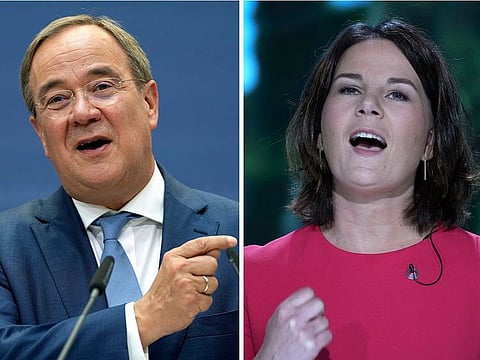What you need to know about Germany’s elections
The outcome of the vote will shape the future of Europe’s largest economy

Germany’s parliamentary elections on September 26 will signal the end of Chancellor Angela Merkel’s 16 years in power. Little else is certain.
It is the most open race in decades. The lead position in the polls has shifted between three main parties: Merkel’s centre-right Christian Democratic Union, the Greens and the center-left Social Democratic Party.
The outcome of the vote will shape the future of Europe’s largest economy and the wider European Union and its dealings with allies such the United States and rivals including Russia and China.
Who are the candidates?
Germans do not directly vote for a chancellor, but the biggest parties have named their contenders for the top job.
Armin Laschet, 60, is leader of Merkel’s Christian Democratic Union and premier of Germany’s most populous state, North Rhine-Westfalia. He tussled with the leader of the CDU’s smaller sister party, the Christian Social Union, for their joint nomination for chancellor and won out, despite being the far less popular of the two among the public. He has stumbled on the campaign trail, including an incident in which he was caught on camera laughing during a memorial to victims of deadly floods in July.
Olaf Scholz, 63, of the Social Democratic Party, is a familiar face to Germans as the country’s finance minister and vice chancellor under its current two-party coalition government. A technocrat not known for his charisma, some have dubbed him “Scholzomat” for his dry, mechanical tone. Yet he has emphasized his government experience and run a steady campaign.
Annalena Baerbock, 40, is the Greens first official candidate for chancellor. When her nomination was announced earlier this year, she looked like she had a shot at becoming chancellor. But she has come under fire from rivals for a lack of experience in governing and was embroiled over questions over her resume and accusations of plagiarism.
When will Merkel leave?
Not right away. Only once in Germany’s postwar history has it been ruled by a single party. German politics are increasingly fragmented. No party is expected to emerge from the elections with anywhere close to an outright majority in parliament.
That will mean coalition negotiations between at two or even three parties to form a government. It could take weeks or longer. After the 2017 election, it took more than five months for a new government to be sworn in, after record-breaking coalition talks.
What other parties are in the mix?
The pro-business Free Democratic Party is a favored possible coalition partner for the Social Democratic Party and the Christian Democratic Union. This gives it a potential kingmaker role.
The Social Democratic Party also has also not ruled out turning to Die Linke, or the Left, for support. But there is still some stigma attached to a group built from the remnants of the successor to the ruling party of Communist East Germany. Die Linke’s foreign policy positions include a demand to dissolve Nato, making it a complicated partner for governing.
The far-right Alternative for Germany, or AfD, stormed into parliament four years ago as the third-biggest party, pushing an anti-immigrant stance. Mainstream parties have ruled out any possible coalition pacts with the AfD.
How does the election work?
German elections are notoriously complicated, mixing the “first past the post” system used in Britain and proportional representation. That means that more than 60 million Germans eligible to vote can cast two ballots each. One goes directly for a local candidate. The second decides the size of a party’s representation in parliament, or the Bundestag.
One complication is “overhang” seats. This comes into play when a party wins more directly elected seats than its share under the all-important the proportional balloting.
Other parties then get to add more parliament seats to adjust the proportions. This is why the current Bundestag, meant to have 598 members, has 709.








